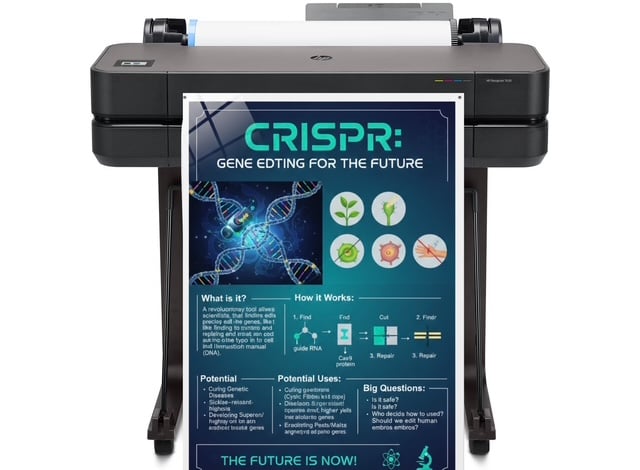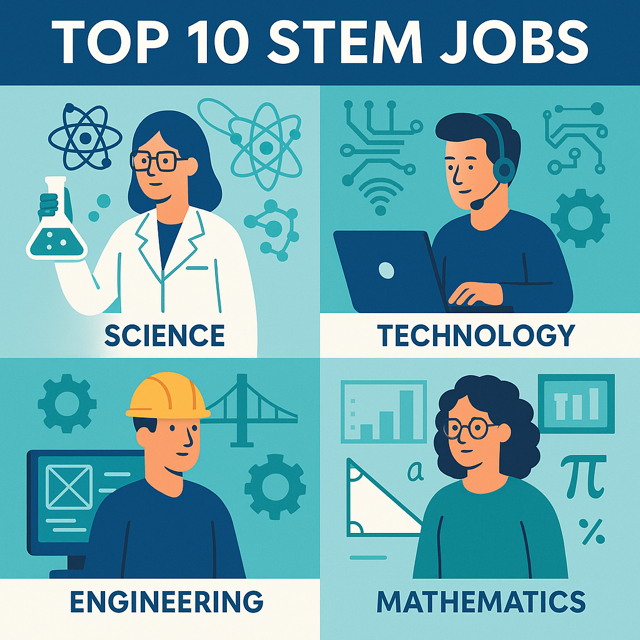The STEM (Science, Technology, Engineering, and Mathematics) job market is booming in 2025, driven by rapid advancements in artificial intelligence (AI), cybersecurity, and green technology. With STEM occupations projected to grow by 15% from 2021 to 2031, according to the U.S. Bureau of Labor Statistics, these fields offer not only job security but also lucrative salaries. For students, career switchers, and educators, understanding the highest-paying STEM jobs is key to navigating this dynamic landscape. In this guide, we explore the top 10 STEM jobs paying over $100K in 2025, including salaries, job roles, required skills, and how to break into these fields. Whether you’re eyeing a six-figure salary or planning your educational path, this list will help you future-proof your career.
Why STEM Jobs Are in Demand in 2025
STEM careers are at the forefront of innovation, addressing global challenges like climate change, healthcare advancements, and digital transformation. The rise of AI, automation, and data-driven decision-making has created a surge in demand for skilled professionals. According to a 2025 World Economic Forum report, AI alone is expected to create 97 million new jobs by 2027, many in STEM fields. Meanwhile, high-paying roles requiring creativity, critical thinking, and technical expertise remain resistant to automation. Here’s our curated list of the top 10 STEM jobs offering salaries above $100,000 in 2025, based on data from sources like Forbes, CNBC, and Glassdoor.
1. Machine Learning Engineer
- Average Salary: $161,800
- Job Openings: 16,000 (2025 estimate)
- Why It’s Hot: Machine learning engineers design algorithms that power AI systems like ChatGPT or autonomous vehicles. They’re in high demand across tech giants (e.g., Google, Uber) and startups.
- Key Skills: Python, PyTorch, TensorFlow, data modeling, and cloud platforms (AWS, Azure).
- How to Get Started: Earn a degree in computer science or take online courses like Microsoft’s AI & ML Engineering Professional Certificate on Coursera. Build a portfolio with projects like image recognition models.
- Pro Tip: Focus on generative AI applications, as the NLP market is projected to hit $43 billion by 2025.
2. AI Research Scientist
- Average Salary: $295,000–$440,000
- Job Openings: 2,000
- Why It’s Hot: AI research scientists develop cutting-edge algorithms for companies like OpenAI. They drive innovation in areas like natural language processing and computer vision.
- Key Skills: Advanced mathematics, deep learning frameworks, research experience, and a Ph.D. in AI or related fields.
- How to Get Started: Pursue a graduate degree and contribute to open-source AI projects. Internships at research labs (e.g., DeepMind) are a great entry point.
- Pro Tip: Stay updated on AI ethics trends to stand out in interviews. AI tools in schools have changed the game.
3. Cybersecurity Engineer
- Average Salary: $135,000
- Job Openings: 20,000
- Why It’s Hot: With cybercrime costs projected to hit $639 billion in 2025, cybersecurity engineers protect organizations from data breaches and ransomware.
- Key Skills: Network security, ethical hacking, cloud security (AWS, Azure), and certifications like CISSP or CEH.
- How to Get Started: Start with entry-level roles like security analyst and earn certifications through CompTIA or EC-Council.
- Pro Tip: Specialize in AI-driven cybersecurity tools to align with emerging trends.
4. Data Scientist (AI Applications)
- Average Salary: $131,000
- Job Openings: 10,700
- Why It’s Hot: Data scientists use AI to analyze massive datasets, providing insights for industries like finance, healthcare, and retail.
- Key Skills: SQL, Python, Tableau, statistical analysis, and machine learning.
- How to Get Started: Enroll in a data science bootcamp or a degree in statistics/computer science. Build projects like predictive models for stock prices.
- Pro Tip: Master tools like PowerBI for visualizing data to boost employability.
5. Natural Language Processing (NLP) Engineer
- Average Salary: $156,000
- Job Openings: 6,000
- Why It’s Hot: NLP engineers build systems like virtual assistants and chatbots, fueled by the generative AI boom.
- Key Skills: Python, NLP libraries (NLTK, spaCy), and large-scale data processing.
- How to Get Started: Take online courses in NLP (e.g., Coursera’s Google AI Essentials) and create a chatbot project for your portfolio.
- Pro Tip: Highlight experience with transformer models like BERT to impress employers.
6. AI Product Manager
- Average Salary: $300,000–$900,000
- Job Openings: 1,500
- Why It’s Hot: AI product managers bridge technical teams and business goals, overseeing the development of AI-powered products at companies like Netflix.
- Key Skills: Product lifecycle management, AI literacy, and stakeholder communication.
- How to Get Started: Gain experience in project management and take AI-focused business courses. Certifications like PMI’s PMP can help.
- Pro Tip: Learn basic coding to better collaborate with engineering teams.
7. Robotics Engineer
- Average Salary: $150,000
- Job Openings: 5,000
- Why It’s Hot: Robotics engineers design robots for manufacturing, healthcare, and logistics, with demand growing as automation expands.
- Key Skills: C++, ROS (Robot Operating System), and mechanical engineering principles.
- How to Get Started: Pursue a degree in robotics or mechanical engineering. Participate in robotics competitions like FIRST Robotics.
- Pro Tip: Focus on healthcare robotics, as surgical robots are a growing niche.
8. Cloud Solutions Architect
- Average Salary: $145,000
- Job Openings: 12,000
- Why It’s Hot: Cloud architects design scalable systems for AI and data storage, with companies like Amazon and Microsoft leading the charge.
- Key Skills: AWS, Azure, Kubernetes, and infrastructure-as-code tools.
- How to Get Started: Earn certifications like AWS Certified Solutions Architect and work on cloud migration projects.
- Pro Tip: Specialize in hybrid cloud solutions to meet enterprise demands.
9. Biomedical Engineer
- Average Salary: $120,000
- Job Openings: 8,000
- Why It’s Hot: Biomedical engineers develop medical devices like prosthetics and diagnostic tools, with AI enhancing personalized medicine.
- Key Skills: Biomechanics, AI integration, and regulatory knowledge (e.g., FDA standards).
- How to Get Started: Study biomedical engineering and intern at medical device companies.
- Pro Tip: Focus on AI-driven diagnostics to align with healthcare trends.
10. Software Architect (AI-Driven)
- Average Salary: $150,000
- Job Openings: 7,000
- Why It’s Hot: Software architects design AI-integrated systems, ensuring seamless data flow for applications like autonomous vehicles.
- Key Skills: Software design, AI frameworks, and cloud platforms.
- How to Get Started: Gain experience as a software developer and pursue AI certifications.
- Pro Tip: Build expertise in microservices architecture to stand out.
How to Break Into These High-Paying STEM Jobs
- Education and Certifications: Most roles require a bachelor’s degree in a STEM field, with advanced roles needing master’s or Ph.D. degrees. Online platforms like Coursera and edX offer affordable certifications in AI, cybersecurity, and data science.
- Build a Portfolio: Showcase projects like AI models, cybersecurity audits, or robotics prototypes on GitHub or a personal website.
- Networking: Attend industry events like the ASU-GSV Summit or join X communities with hashtags like #STEMCareers to connect with professionals.
- Stay Updated: Follow trends on X and blogs like Forbes to stay informed about emerging skills like AI ethics or quantum computing.
- Upskill with AI Tools: Use AI platforms like Google Colab or Microsoft 365 Copilot to enhance productivity and demonstrate tech-savviness.
Why These Jobs Are Future-Proof
While AI is automating routine tasks, these roles require human creativity, problem-solving, and ethical judgment, making them resistant to full automation. A 2024 OECD report estimates only 10% of high-level STEM tasks are automatable by 2040. By focusing on skills like critical thinking and AI literacy, you can thrive in these fields.
Conclusion
The STEM job market in 2025 offers unparalleled opportunities for those ready to adapt. From machine learning engineers to biomedical innovators, these high-paying roles combine technical expertise with real-world impact. Start by exploring online courses, building projects, and networking with industry leaders. Ready to take the next step? Check out resources on Coursera or follow #STEMJobs on X for the latest opportunities.
Sources: Forbes, CNBC, U.S. Bureau of Labor Statistics, World Economic Forum, Glassdoor

